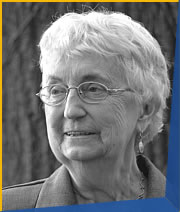
Lorraine M. Sheehan, 72, a former Maryland Secretary of State who championed the rights of people with disabilities, died Dec. 19 at Johns Hopkins University Hospital in Baltimore.
She died of complications from cystic fibrosis. She had been an Edgewater resident for 26 years.
Mrs. Sheehan, a Democrat, served as a Prince George's County state delegate from 1974 to 1983, when Gov. Harry R. Hughes chose her to be secretary of state. At the time she was the third woman to serve in that capacity since the position's creation in 1838.
"Women who have for so long been the backbone of political campaigns are now deciding that they want a piece of the action," Mrs. Sheehan told The Washington Post in 1980. "It takes a tremendous ego to run for public office. . . . A person has to stand up before a group with the attitude: 'I'm the best person for this job.' A lot of women don't perceive themselves as being that kind of person. They don't want to get up on the platform and say: 'Look, I'm smart. I know where we ought to be going, and I can help to get us there.' "
Mrs. Sheehan's biggest focus while in the House of Delegates was the creation and funding of programs for people with disabilities. Her son John was born with mental disabilities and was later found to have autism. She introduced the first bill addressing the state Developmental Disabilities Administration's waiting list for residents eligible for service, which Mrs. Sheehan said was too long and underfunded.
A bespectacled, spunky woman who was known to wear ponchos and colored stockings, Mrs. Sheehan was recognized for her public service in 2002 when she was inducted into the Maryland Women's Hall of Fame.
Lorraine Marie Cantin, a native of Manchester, N.H., moved to the Washington area in the mid-1960s. As a delegate, Mrs. Sheehan served on the House Judiciary Committee and the House Ways and Means Committee. She resigned as secretary of state in 1987. Shortly after, she joined Melwood, a nonprofit organization in Upper Marlboro that provides housing, job training and employment opportunities for people with intellectual and developmental disabilities.
In the mid-1990s, Mrs. Sheehan became the public policy director for the Baltimore-based Maryland Disability Law Center and also had a private business as a lobbyist in Annapolis for organizations and issues involving disability rights. For many years, she served as the president of what is now known as The ARC of the United States, a community-based organization for the developmentally disabled.
Her marriage to Peter Sheehan ended in divorce. Besides her son John, of Edgewater, survivors include three children, Peter Sheehan of Hedgesville, W.Va., Niall Sheehan of Laurel and Laura Carr of Edgewater; and seven grandchildren.
When John, now 43, was found to have autism, Mrs. Sheehan refused to institutionalize him as his doctors and educators had suggested. Instead, she crafted legislation in the House of Delegates that would help those with disabilities live on their own in decent housing. Many years ago, Mrs. Sheehan set up a trust to pay for her son's expenses so he could remain in the house where he grew up, in the neighborhood where everyone knows his name.
"Nobody wants to think they are going to die," Mrs. Sheehan told the Baltimore Sun last year. "But it certainly is a relief and comfort to know you . . . have a fighting chance to keep John happy as he is now."
T. Rees Shapiro 12/24/2009 shapirot@washpost.com

